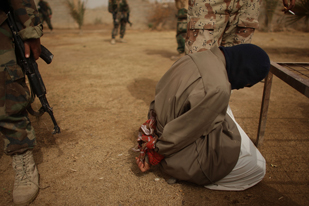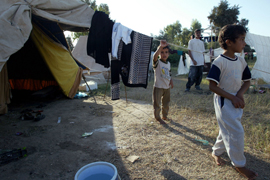Bush says Iraq surge is ‘working’
Bush defends US-led invasion as Iraq war enters sixth year.

The US president acknowledged that work still had to be done.
| In Focus |
|
|
“The gains we’ve made are fragile and irreversible, but on this anniversary, the American people should know that since the surge began, the level of violence is significantly down, civilian deaths are down, sectarian killings are down,” Bush said.
“We have captured or killed thousands of extremists in Iraq, including hundreds of key al-Qaeda leaders and operatives.
“The surge is working and as a return of the success in Iraq we have begun bringing some of our troops home.”
However, he said that US troop withdrawals from Iraq above those already agreed “must not jeopardise” what he called recent improvements in security there.
Invasion aftermath
The war is estimated to have already cost the US more than $400bn, making it the most expensive conflict in history.
The 2003 invasion plunged Iraq, a country of 26 million people, into chaos and bloodshed.
| Your Views |
Iraqis and US forces still face daily attacks from armed groups, and fighting between armed factions from both sides of Iraq’s Sunni-Shia sectarian divide rages on.
The economy, the main concern of Iraqis after security, is in deep crisis.
Marwan Bishara, Al Jazeera’s senior political analyst, said it was interesting that the speech was Bush’s first Iraq war anniversary address from the Pentagon.
He said it was also notable that Bush referred to his status as commander-in-chief, rather than the US president.
“This was a military speech, not a political speech,” he said.
Bishara said that Bush had neglected in his address to give a balanced picture of the events, challenges and the human cost of the war.
|
Related link | ||
|
“Before 2005, he would speak about the challenges or the difficulties. This year he could have spoken about political reconciliation in Iraq. He didn’t.”
“He did not give us a balance sheet [on progress in Iraq], but a one-way street where he has selective memory of all the successes but none of the failures or challenges that the US faces in Iraq, or that Iraq faces under occupation.”
Critics unimpressed
Bush’s speech on the war anniversary comes as he faces continued criticism for his administration’s strategy.
| In Video | ||
|
|
Even General David Petraeus, the commander of US forces in Iraq, admits that the country has made insufficient progress towards national reconciliation.
Hady Amr, a Middle East analyst at the Brookings Institution in Doha, Qatar, told Al Jazeera that the US-led invasion of Iraq was a strategic disaster.
He said: “When you have at least 200 Iraqis dying every month in attacks on a per capita equivalent … I don’t know how anyone can characterise that as a success.”
“The US took a country that had a lot of problems, a totalitarian state, and turned it into a haven for terrorism.”
Deteriorating situation
So far, the war has killed more than 4,000 US and allied soldiers and tens of thousands of Iraqi civilians.
Between 104,000 and 223,000 died between March 2003 and June 2006 alone, according to the World Health Organisation.
The International Committee of the Red Cross, in its latest report, said the plight of millions of Iraqis who still have little or no access to clean water, sanitation or health care was the “most critical in the world”.
 |
| The US says the troop ‘surge’ of 2007 has helped reduce violence in Iraq [GETTY] |
Iraq‘s parliament has been paralysed by competition between parties driven by sectarian interests.
Last year the US embassy in Baghdad documented a high level of corruption at all levels of government, and questioned the willingness of Nuri al- Maliki, the Iraqi prime minister, to crack down on crooked practices.
Nevertheless, there has been progress towards peace in large areas of southern and central Iraq, where the situation is far less violent than it was even a year ago.
An increase or “surge” in US forces, which over the past year increased the level of troops to more than 160,000, has helped reduce the violence, and tens of thousands of Sunni former armed groups have been recruited to fight al-Qaeda.
At the same time, Muqtada al-Sadr, the Shia leader, has ordered his powerful Mahdi Army militia to refrain from attacks on Iraqi civilians and security forces.
Armed groups, however, continue to carry out spectacular attacks.
“Certainly there is an effect from the surge, and the US military figures show that attacks are down,” James Bays, Al Jazeera’s correspondent in Iraq, said on Wednesday.
“But they show that attacks are down to the level of 2005. So it’s fair to say that it has gone from extremely bad, but 2005 was not a peaceful time in Iraq. It’s still very very dangerous on the streets.
“Just today we have had a number of attacks – a colonel in the interior ministry was assassinated, a truck bomb in Mosul killed 14 people, and a female suicide bomber in Diyala province, about 70km north-east of Baghdad, killed four people. That is the level of violence we are seeing on a daily basis.”
Failed economy
The economy is in deep trouble, with unemployment running at between 25 and 50 per cent of the workforce, according to government figures.
 |
|
More than two million Iraqis have fled the |
Oil exports are the country’s main money earner and a key source of contention between rival political factions.
Iraqi officials say production is at 2.9 million barrels a day, higher than pre-war levels, oil analysts believe it is really around 2.2 million.
Public services like water and electricity have yet to be fully restored, despite billions of dollars having been spent on often badly managed reconstruction projects.
Government calls for Iraqi refugees to return to help rebuild the country have been largely ignored.
Fewer than 50,000 have returned from neighbouring Jordan and Syria, while more than two million have fled.


